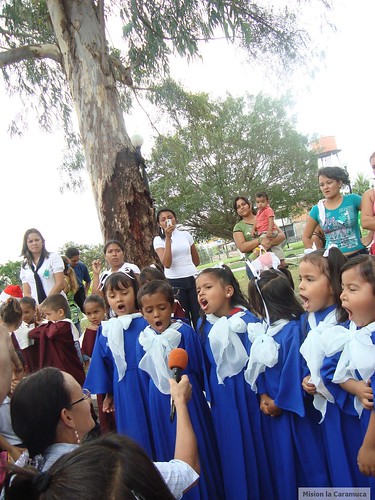 A group of our older preschool children placed first in a Christmas carol-singing contest in the town square November 30, 2010. The group, which we called "Niños Cantores" (Singing Children) competed against similar groups from all the other preschools in our area. Niños Cantores included:
A group of our older preschool children placed first in a Christmas carol-singing contest in the town square November 30, 2010. The group, which we called "Niños Cantores" (Singing Children) competed against similar groups from all the other preschools in our area. Niños Cantores included:- Karla Altuve
- Brayan Arteaga
- Geiver Cordero
- Sugleisbeth Pérez
- Marlenis Piñero
- María Ruiz
- Solisbeth Sanchez
- Lorianny Vivas
In fact, Spanish versions of some carols familiar to North Americans are popular in Venezuela. One example would be "Noche de Paz" ("Silent Night" in English or "Stille Nacht" in the original German). There also is a song sung in Venezuela to the tune of "Jingle Bells," but intead of "dashing through the snow in a one-horse open sleigh", the lyrics speak of Christ's birth and the joy of Christmastide.
However, many villancicos are written in colloquial Spanish and allude to things specific to their country of origin, even a particular region within that country. That can make them difficult to translate into English. Such is the case with "El Niño Jesús Llanero," a song that our preschool children were assigned to sing.
"El Niño Jesús Llanero" is actually a modern villancico, written by Simon Diaz, a Venezuelan folk singer and entertainer who still is very much alive. Born August 8, 1928, in Barbacoas, Venezuela, he is known throughout the country as "Tio Simon" (Uncle Simon), because of his long-running children's television program, "Contesta por Tio Simon". Indeed, over the years Simon Diaz has hosted many different radio and television programs, appeared in films and stage plays, and recorded more than 70 musical albums. His works have been performed by artists such as Placido Domingo, Ray Conniff, Julio Iglesias and Ruben Blades. In 2008, Simon Diaz received the the Latin Recording Academy Trustees Award in Houston, Texas.
Despite Diaz's international reputation, however, the focus of his life's work has been to preserve and renew the culture of Venezuela, especially that of los Llanos, the Venezuelan plains region. So it is with "El Niño Jesús Llanero." In keeping with the Savior's humble origin, the song paints a poetic portrait of the Christ Child as an Indian boy of the prairie, clad in sandals (although sandals of gold) and a white hat, with a spinning top in his hand as is typical of such boys.
The following is the chorus and first verse of the song, with my attempt at English translation:
En mi conuquito
Las flores del campo
adornan su belleza
y brille su splendor
Niñito llanero, indio soberano
dámele cariño, dámele ternura
al venezolano
In my garden, the wildflowers
adorn your beauty and shine with your splendor
Little prairie boy, Lord of Indians
Show affection and tenderness to Venezuela
The second song was to be a traditional carol of our own choosing, which was "Cantemos, cantemos." This one is much easier to translate:
Cantemos, cantemos, gloria al Salvador
Feliz nochebuena, feliz nochebuena
con el Niño Dios
Tu eres la esperanza, Tu la caridad, Tu eres el consuelo de humanidad.
Let us sing, let us sing, glory to the Savior
Happy Christmas Eve, Happy Christmas Eve
with the Christ Child
You are the hope, you are the charity, you are the consolation of mankind.
The third song was to be an original, unpublished composition. Luz Maria wrote this one:
Repiquen los tambores, suenen las maracas
nosotros cantamos, nosotros cantamos
si nos dan hallacas
Alegres cantamos en este parrandón
saberes y sabores, saberes y sabores
con el Niño Dios
A nuestras maestras, las gracias les damos
y a los que no escuchan, a los que no escuchan
dame mi aguinaldo
Que no sean pichirres, que no sean pichirres
nosotros no vamos
Beating drums, maracas sounding
we will sing, we will sing
if you give us hallacas
Let us sing joyfully at this festival
of crafts and cooking, of crafts and cooking
with the Christ Child
To our teachers, we give thanks
and to those who will listen, who will listen
(we say) Give me my Christmas treat
To those who are cheapskates, to those who are cheapskates
we will not go
The hallaca is the traditional Venezuelan Christmas tamale.

No comments:
Post a Comment